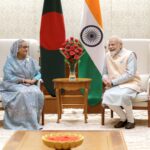DHAKA, Bangladesh—A special tribunal in Bangladesh’s capital erupted in applause on November 17, as judges sentenced former Prime Minister Sheikh Hasina to death for crimes against humanity, marking a stunning reversal of fortune for a woman who dominated the nation’s politics for 15 years and capping one of South Asia’s most dramatic political upheavals in recent memory.
The verdict, delivered amid tight security and street protests, found Hasina guilty of ordering lethal force against student-led demonstrators during last year’s deadly crackdown that left hundreds dead and ultimately forced her from power. The 78-year-old former leader, tried in absentia as she lives in exile in India, immediately denounced the proceedings as a “farce” orchestrated by what she called a “kangaroo court.”
“I am not afraid to face my accusers in a proper tribunal where the evidence can be weighed and tested fairly,” Hasina said in a defiant five-page statement released shortly after the 453-page judgment was read. She challenged the interim government to bring charges before the International Criminal Court in The Hague, adding that she remained “very proud of my government’s record on human rights and development.”
The death sentence represents far more than the legal fate of one leader. It crystallizes years of bottled-up rage over political repression, threatens to destabilize an already fragile economy, and poses a delicate diplomatic challenge for India, which has shown no indication it will extradite its neighbor despite formal requests from Dhaka.
Seeds of Revolution
The crisis that toppled Hasina began not with grand ideological confrontations but with a seemingly arcane dispute over civil service jobs. Since Bangladesh’s bloody 1971 war of independence from Pakistan, the government had reserved 30% of all civil service positions for veterans and their descendants—a policy initially designed to honor those who fought for the nation’s freedom.
By 2024, however, the quota system had morphed into something else entirely: a mechanism for political patronage that funneled coveted government jobs to supporters of Hasina and her Awami League party based on ancestry rather than merit. For young Bangladeshis facing unemployment rates that had soared amid a struggling economy, the system became an emblem of corruption and cronyism.
Student protesters took to the streets in July 2024, their grievances amplified by social media and mobile phone footage that documented the government’s response. What began as demonstrations against job quotas exploded into a broader uprising against 15 years of increasingly authoritarian rule marked by the stifling of dissent and systematic repression.
Security forces responded with brutal force. Video captured on smartphones showed police firing on unarmed protesters, killing hundreds including children. The images spread like wildfire across social media, igniting public fury that transcended the original grievances about employment.
“The violent crackdown was the spark, but the fuel had been accumulating for years,” said a Western diplomat in Dhaka, speaking on condition of anonymity. “This was about much more than job quotas. It was about dignity, opportunity, and basic freedoms.”
By August 5, 2024, with protests spiraling beyond control and the military wavering, Hasina fled to India aboard a military aircraft. Crowds stormed her official residence in Dhaka as the Awami League’s grip on power collapsed almost overnight.
India’s Dilemma
Hasina’s refuge in India represents her second such sanctuary in the South Asian giant. Nearly five decades earlier, she arrived in New Delhi with her sister after their father, Bangladesh’s founding president Sheikh Mujibur Rahman, was assassinated in a 1975 military coup. Then-Prime Minister Indira Gandhi granted the sisters political asylum, and they lived in Delhi for six years under assumed identities.
Those ties have endured. Hasina forged especially close relationships with Indian leaders, including late President Pranab Mukherjee, and her government maintained warm relations with Prime Minister Narendra Modi’s administration. India views Bangladesh as a crucial buffer against regional instability and values the economic ties between the two nations.
Now, New Delhi finds itself caught between competing pressures. Bangladesh’s interim government, led by Nobel laureate Muhammad Yunus, has formally requested Hasina’s extradition. But Indian officials have remained conspicuously silent on the verdict, and diplomatic sources suggest the Modi government has no intention of handing over a leader it considers an ally.
“This puts India in an extremely awkward position,” said a South Asia analyst at a Washington-based think tank. “They can’t be seen as harboring someone convicted of crimes against humanity, but they also don’t want to set a precedent that could affect their own interests or destabilize the region further.”
The tribunal sentenced Hasina alongside two co-defendants: former Interior Minister Asaduzzaman Khan Kamal and ex-police chief Chowdhury Abdullah Al-Mamun. Prosecutors argued they personally ordered the use of deadly weapons against protesters and failed to prevent atrocities. Al-Mamun, the only defendant present in court, had pleaded guilty in July and provided testimony as a state witness.
Global Reverberations
The verdict’s implications extend far beyond Bangladesh’s borders. The interim government faces the herculean task of rebuilding institutions hollowed out by years of one-party dominance while stabilizing an economy heavily dependent on garment exports. Yunus has reduced the controversial job quota system to just 5%, secured loans from the International Monetary Fund, and boosted foreign reserves, but the country needs substantial foreign investment that political instability makes elusive.
International human rights organizations have called for accountability for the protest deaths, though some observers question whether a trial conducted in the defendant’s absence can meet international standards of justice. The UN previously confirmed that hundreds died in the crackdown, lending weight to demands for accountability.
“Neither Sheikh Hasina nor the Awami League have apologized or expressed remorse for what happened,” noted one Bangladeshi civil society leader. “That silence has only deepened the anger among families who lost loved ones.”
On Monday, as the verdict was announced, protesters gathered outside Dhanmondi 32, the former home of Hasina’s father, chanting slogans demanding justice. Police fired stun grenades to disperse crowds attempting to march on the property, which has been attacked multiple times since last August. The scene underscored the continuing tensions in a nation still processing its political trauma.
Uncertain Future
Whether Hasina will ever face the death penalty remains highly uncertain. Without extradition from India, enforcement appears impossible, potentially leaving the verdict as a symbolic statement rather than practical justice. Some observers suggest the sentence reflects the interim government’s determination to prevent the Awami League from regaining political influence.
“The death penalty is the interim government’s way of nullifying the Awami League as a political force,” Hasina alleged in her statement, capturing the political stakes that extend beyond individual accountability to the future direction of Bangladesh itself.
For now, Hasina remains in India, her political legacy in ruins and her future in limbo. The nation she once led confronts the challenge of building a more inclusive political system from the wreckage of what many Bangladeshis view as an authoritarian regime. The verdict may bring a measure of satisfaction to protest victims’ families, but the hard work of reconciliation and institutional reform has only begun.
As night fell on Dhaka Monday, demonstrators carrying torches marched through the university district, their chants echoing through streets where, just over a year ago, students risked everything to challenge a leader who seemed unshakeable. The applause that rang through the courtroom represented not just judgment on one woman’s actions, but a nation’s determination to close a bitter chapter in its history.
Disclaimer: The opinions and views expressed in this article/column are those of the author(s) and do not necessarily reflect the views or positions of South Asian Herald.






